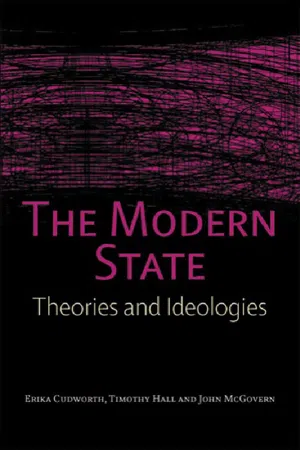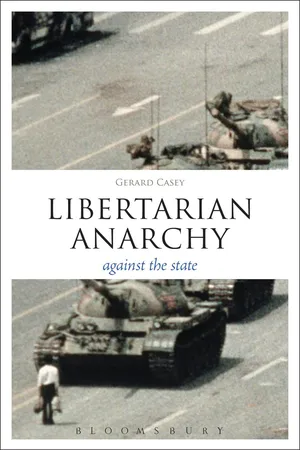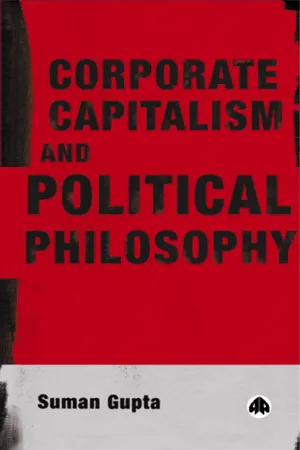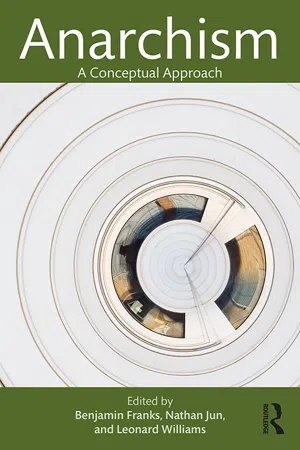Politics & International Relations
Anarcho-Capitalism
Anarcho-capitalism is a political philosophy that advocates for a stateless society where all services, including law enforcement and national defense, are provided by the free market. It combines the principles of anarchism, which opposes government intervention, with the principles of capitalism, which supports private ownership and free markets. Proponents believe that individual freedom and voluntary interactions should be the guiding principles of society.
Written by Perlego with AI-assistance
Related key terms
1 of 5
7 Key excerpts on "Anarcho-Capitalism"
- eBook - PDF
The Modern State
Theories and Ideologies
- Erika Cudworth, Timothy Hall, John McGovern(Authors)
- 2020(Publication Date)
- EUP(Publisher)
In sharp contrast, ‘Anarcho-Capitalism’ (Miller 1984) or ‘individu-alist anarchism’, exemplified by the work of Murray Rothbard Anarchism: the Politics of Anti-Statism 139 (1978), is an extreme form of liberalism based on the absolute sov-ereignty of the individual (also Nozick 1974: Part 1). In the nine-teenth century an important advocate of such individualism was Max Stirner (1845), whose suggestion that we are all (essentially) self-interested and self-seeking has been an element of conservative and liberal approaches (see Chapter 10). What is often referred to as ‘classical anarchism’ however, was a left-orientated response to nineteenth-century developments, specifically the processes of industrialisation and new forms of labour relations, the increasing powers of the state and a concern with the escalation of the scale of warfare. Anarchism as an organ-ised political force stemmed from the debates between followers of Marx and those of Bakunin in the First International. Both ‘anar-chists’ and ‘Marxists’ agreed on the exploitative nature of capital-ism, but differed on the nature of the state itself. Whereas the predominant view of Marx and Engels was a form of class instru-mentalism, anarchists argued that the structure and actions of the state cannot be read off as either functional for the logic of the cap-italist system, or as a direct instrument of class interests. This said, there are anarchists who have argued for the strong commonalities between Marxian and anarchist theory. Daniel Guérin (1989: 118) considers that there are grounds for fertile theoretical relations between anarcho-communism and ‘authentic Marxism’. In my view, there are five elements which make anarchist state theorising distinctive: the conception of human nature; an understanding of social contract; a broad notion of social domination; the articula-tion of interest by the state; and the possibility of the state as an agent of political change. - Gerald F. Gaus, Fred D'Agostino, Gerald F. Gaus, Fred D'Agostino, Gerald Gaus, Ryan Muldoon(Authors)
- 2012(Publication Date)
- Routledge(Publisher)
Social anarchists, while generally recognizing individualist anarchism as a genuine (albeit mistaken) form of anarchism, largely deny that Anarcho-Capitalism counts as anarchist (and similarly reject the anarchist credentials of such forerunners as Molinari and Spencer), on the grounds that anarchism, whether social or individualist, has traditionally been anti-capitalist. This dispute is partly terminological (since by “capitalism” anarcho-capitalists mean a completely free market, while most individualist anarchists have reserved the term for a system of privilege which they take to result from government intervention), but also substantive: social anarchists charge that anarcho-capitalists countenance economic relationships that “genuine” individualist anarchists reject, such as rent, profit, interest, hierarchical workplaces, and the wage system, and so conclude that Anarcho-Capitalism is simply a rationalization for corporate power and existing property holdings. But it is difficult to find a criterion that draws the division neatly: Spooner, for example, is recognized by social anarchists as a genuine individualist anarchist despite his support for rent, while Konkin and Friedman are rejected despite their opposition to hierarchical workplaces and the wage system; and many anarcho-capitalists have attacked corporate power (Childs 1971) and called for thoroughgoing redistribution to rectify past injustice (Rothbard 1969, 2008). Anarcho-capitalists for their part tend to challenge the libertarian credentials of social anarchists, generally on equally contestable grounds.8. Recent AnarchismThe political ferment of the mid-twentieth century saw the revival of social anarchism as well (see, e.g., Ward 1992; Goodman 1994; Zinn 1997; Graeber 2004; Chomsky 2005); in recent decades, social anarchists have played a leading role in the anti-globalization and Occupy movements. The growth of the internet has given additional impetus to the propagation of anarchist ideas, both social and individualist.At a theoretical level, both social anarchists (Taylor 1982) and anarcho-capitalists (Narveson 1988; De Jasay 1997; Stringham 2005; Skoble 2008a) have employed game-theoretic arguments to show that cooperation represents a stable equilibrium under stateless conditions; likewise, both social anarchists (Clastres 1989; Scott 2010) and anarcho-capitalists (Friedman 1979; Anderson and Hill 2004; Benson 2011) have appealed to historical examples of stateless societies to demonstrate anarchism’s viability.Although there are exceptions (Proudhon being an especially egregious one), anarchists have traditionally embraced feminist concerns, seeing patriarchy, statism, and capitalist privilege as mutually reinforcing forms of social control (McElroy 1991; Long and Johnson 2005), and contemporary anarcha-feminists (e.g., Brown 1993; Lilith 2011) have made the same identification.The anarchist community continues to be the scene of vigorous debate on many topics, including the legitimacy of private property (or, among those accepting private property, the legitimacy of absentee land ownership) and the extent to which prevailing capitalist economic forms are the result of free markets or of government intervention. (Interestingly, the rejection of intellectual property seems to have become the dominant position among all schools of anarchism.) Also in dispute are the appropriate moral foundations for anarchism (e.g., consequentialist vs. deontological), as well as whether anarchism should respect the authority of morality at all. With respect to religion, for some adherents anarchism’s anti-authoritarianism entails atheism, and the slogan “no gods, no masters” is popular in the movement; but for others, it is precisely respect for God’s authority that discountenances all human authority. And views on technology vary from the “technoanarchist” embrace of high-tech urban life (Kostelanetz 1999), through the preference for decentralized, human-scale, more environmentally responsible forms of technology (Goodman 1994; Bookchin 2004), all the way to the complete rejection of industry, civilization, and even language itself, as found in anarcho-primitivism (Zerzan 1994).- eBook - PDF
Libertarian Anarchy
Against the State
- Gerard Casey(Author)
- 2012(Publication Date)
- Continuum(Publisher)
If the term ‘anarchy’ is troublesome the term ‘capitalism’ is scarcely less so. ‘Capitalism’ carries so much emotional and conceptually confusing baggage, either positive or negative depending on your point of view, that it can scarcely be used in a neutral descriptive way. Noam Chomsky was once asked what he thought of Anarcho-Capitalism and despite conceding that he agreed with anarcho-capitalists on a range of issues, appreciated their willingness to publish his material when no one else would and being complimentary about their commitment to rationality, he said that a society foolish enough to allow its implementation would be destroyed. ‘Anarcho-Capitalism . . . is a doctrinal system which, if ever implemented, would lead to forms of tyranny and oppression that have few counterparts in human history. . . . The idea of “free contract” between the potentate and his starving subject is a sick joke. . . .’ 8 Murray Rothbard tried to make conceptual space for the term ‘Anarcho-Capitalism’ by distinguishing two different kinds of capitalism, remarking that ‘the term “capitalism” was coined by its greatest and most famous enemy, Karl Marx’ but that ‘what Marx and later writers have done is to lump together two extremely different and even ANARCHY AND ANARCHISM 63 contradictory concepts and actions under the same portmanteau term’. These contradictory concepts Rothbard styles ‘free-market capitalism’ and ‘state capitalism’ and the difference between them is ‘precisely the difference between, on the one hand, peaceful, voluntary exchange, and on the other, violent expropriation’. 9 David Osterfeld makes essentially the same point when he distinguishes between economic capitalism and sociological capitalism. Economic capitalism signifies ‘production according to the dictates of the market’ whereas sociological capitalism ‘is defined in terms of . . . the ownership of the means of production by the ‘bourgeois’, or ruling class’. - Suman Gupta(Author)
- 2001(Publication Date)
- Pluto Press(Publisher)
The somewhat superlative term ‘anarchy’ of inter-national politics is, I suspect, merely used to emphasise the difference and even oppositeness of this sphere of political concep-tualisation, the stuff of which is ideology, order, organisation, etc. The international political theorist’s embracing of such a concept as anarchy is a sort of defiant recognition of the absence of conven-tional political conceptualisation at this level. The fact that one of the earliest and clearest modern conceptualisations of political statehood, in Thomas Hobbes’s Leviathan , actually moves straight from the pragmatic considerations of authority within a state to mystical considerations of authority in the kingdom of God, and finds no space for an intermediate consideration of inter-state 158 Corporate Capitalism and Political Philosophy politics (or the concept of a super-Leviathan) seems to set the tone for an inadequate political philosophical focus on this area. 6 Naturally the theorists who choose to focus on international politics against the grain of the Hobbesian trend find themselves drawn towards that area which precedes or is definitively outside conven-tional political philosophical conceptualisation, such as a state-of-nature hypothesis or a condition-of-anarchy hypothesis. Even while following this somewhat defiant philosophical symbology, such theorists do, of course, recognise that the arena of international politics is a happening one, all too real and pragmatic (so much so that international relations is a comparatively young discipline, and largely and till very recently undertheorised), and therefore far from being as unanalysable and unformulable as a condition of true anarchy – or for that matter a hypothesis of a pure state of nature – would have to be.- eBook - ePub
Anarchism
A Conceptual Approach
- Benjamin Franks, Nathan Jun, Leonard Williams(Authors)
- 2018(Publication Date)
- Routledge(Publisher)
On the other hand, despite being at times tempted (or even constrained) to utilize opportunities presented by a global capitalist system and its (literal and figurative) networks, anarchists remain staunchly anti-capitalist in their rhetoric and analysis alike. As Albert Meltzer (2000, 50) pointedly notes, “the philosophy of ‘Anarcho-Capitalism’ dreamed up by the ‘libertarian’ New Right, has nothing to do with Anarchism as known by the Anarchist movement proper.” The logic is clear: capitalism is seen as inherently authoritarian, ruthlessly exploitative, insidiously hierarchical, and logically unsustainable – thus rendering it anathema to anarchism. As observed with the State, the development of reified roles within capitalism tells the story: the boss, the manager, the chief executive, the board, the security guard, the resource extractor; likewise, we can observe nearly everywhere patterns of imposed austerity, privatization of common wealth, and widening inequalities of access and opportunity. Disingenuous concepts of a “free market” apart from state control as equating with individual freedom run counter to anarchism’s search for egalitarian, equitable forms of socioeconomic organization. Moreover, as Uri Gordon (2009, 252) opines, “capitalism can only go so far in delaying its confrontation with the objective limits to its growth,” despite fervent attempts by corporations and the states that sponsor them aimed at “prolonging the period of manageable crisis so as to allow hierarchical institutions to adapt away from capitalism.” In this light, it can be surmised that those profiting from the current system are invested not in ideologies but in the perpetuation of their domination.Against this eventuality, anarchism envisions participatory and nonhierarchical economic forms based on “self-determination, room to act, voluntariness, and cooperation” (Buck 2009, 67). Such a vision is not prescriptive, even as exemplars such as cooperatives and collectives begin to appear as potential alternatives to depersonalized, hierarchized corporate structures. The premise is to cultivate a network of relationships – social, political, economic, and ecological – in which “the processes of social life educate participants - Z. Kazmi(Author)
- 2012(Publication Date)
- Palgrave Macmillan(Publisher)
1 I argue that the neglect of the domestic analogy on the rare occasions anarchist ideas have entered into IR in favor of the dominant, heavily normative, approach common to their wider treatment in political thought sets limits on the contribution anarchism stands to make to the more traditional concerns of state-centric international theory. To exemplify this and orient the rest of the study toward this approach to anarchist ideas in IR, the chapter closes with a short Revisiting Anarchism ● 19 illustration of what I have termed an “anarchical social contract” in aspects of the thought of Pierre-Joseph Proudhon and its relevance to theorizing the anarchistic and contractarian bases of interstate relations. The Anarchists The origins of anarchism have been traced back to antiquity and beyond by those who regard it as a tradition of social and political thought with a distinct, if varied, intellectual lineage. 2 The etymology of the term, anarchy, originates in the Greek word (in its Latin form) ( anarchia), meaning “with- out a leader” and understood more commonly as the condition of being “without a ruler.” From an anthropological perspective, however, acephalous societies stretch back much further in time and today have also been the subject of various studies of actually existing primitive anarchic communi- ties. M. Fortes and E. E Evans-Pritchard’s study of primitive stateless soci- eties in Africa, for example, has pointed to the impressive degree of social solidarity that exists in such communities.- eBook - ePub
The Individualist Anarchists
Anthology of Liberty, 1881-1908
- Frank H. Brooks(Author)
- 2017(Publication Date)
- Routledge(Publisher)
The development of the economic programme which consists in the destruction of these monopolies and the substitution for them of the freest competition led its authors to a perception of the fact that all their thought rested upon a very fundamental principle, the freedom of the individual, his right of sovereignty over himself, his products, and his affairs, and of rebellion against the dictation of external authority. Just as the idea of taking capital away from individuals and giving it to the government started Marx in a path which ends in making the government everything and the individual nothing, so the idea of taking capital away from government-protected monopolies and putting it within easy reach of all individuals started Warren and Proudhon in a path which ends in making the individual everything and the government nothing. If the individual has a right to govern himself, all external government is tyranny. Hence the necessity of abolishing the State. This was the logical conclusion to which Warren and Proudhon were forced, and it became the fundamental article of their political philosophy. It is the doctrine which Proudhon named An-archism, a word derived from the Greek, and meaning, not necessarily absence of order as is generally supposed, but absence of rule. The Anarchists are simply unterrified Jeffersonian Democrats. They believe that "the best government is that which governs least," and that that which governs least is no government at all. Even the simple police function of protecting person and property they deny to governments supported by compulsory taxation. Protection they look upon as a thing to be secured, as long as it is necessary, by voluntary association and cooperation for self-defence, or as a commodity to be purchased, like any other commodity, of those who offer the best article at the lowest price. .. . Compulsory taxation is to them the life-principle of all the monopolies, and passive, but organized, resistance to the tax-collector they contemplate, when the proper time comes, as one of the most effective methods of accomplishing their purposes.Their attitude on this is a key to their attitude on all other questions of a political or social nature. In religion they are atheistic as far as their own opinions are concerned, for they look upon divine authority and the religious sanction of morality as the chief pretexts put forward by the privileged classes for the exercise of human authority. "If God exists," said Proudhon, "he is man's enemy." And, in contrast to Voltaire's famous epigram, "If God did not exist, it would be necessary to invent him," the great Russian Nihilist, Michael Bakounine, placed this antithetical proposition: "If God existed, it would be necessary to abolish him." But although, viewing the divine hierarchy as a contradiction of Anarchy, they do not believe in it, the Anarchists none the less firmly believe in the liberty to believe in it. Any denial of religious freedom they squarely oppose.
Index pages curate the most relevant extracts from our library of academic textbooks. They’ve been created using an in-house natural language model (NLM), each adding context and meaning to key research topics.






